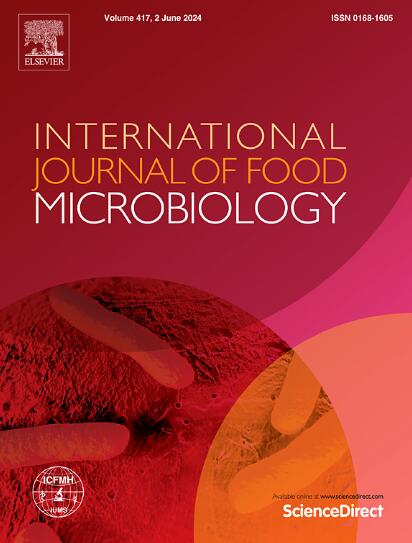Kluyveromyces marxianus YG-4 对苹果上扩张青霉 LPH9 的生物控制活性。
IF 5
1区 农林科学
Q1 FOOD SCIENCE & TECHNOLOGY
International journal of food microbiology
Pub Date : 2024-10-22
DOI:10.1016/j.ijfoodmicro.2024.110943
引用次数: 0
摘要
扩张青霉(P. expansum)是一种广泛传播的真菌病原体,会造成严重的经济损失和公共卫生问题。本研究旨在探讨马氏克鲁维氏菌 YG-4 (K. marxianus YG-4)对扩张青霉的抗真菌作用及可能的机制。结果表明,竞争养分和空间以及释放挥发性有机化合物(VOCs)是其抗真菌机制。根据气相色谱-质谱分析,香茅醇可能是 K. marxianus YG-4 VOCs 的抗真菌成分。进一步的实验表明,香茅醇通过破坏细胞结构、扰乱氧化还原系统、降低抗氧化酶活性和造成氧化损伤来抑制扩张菌 LPH9 的生长。K. marxianus YG-4、K. marxianus YG-4 VOCs 和香茅醇能有效抑制苹果上扩张孢子菌的孢子萌发。上述结果表明,K. marxianus YG-4 具有很强的生物防治活性,可作为水果保鲜的优良候选菌株。本文章由计算机程序翻译,如有差异,请以英文原文为准。
Biocontrol activity of Kluyveromyces marxianus YG-4 against Penicillium expansum LPH9 on apples
Penicillium expansum (P. expansum), a widespread fungal pathogen, causes serious economic loss and public health concerns. The aim of this research is to investigate the antifungal effect of Kluyveromyces marxianus YG-4 (K. marxianus YG-4) against P. expansum and possible mechanism. The results showed that competition for nutrients and space, as well as the release of volatile organic compounds (VOCs), are the antifungal mechanisms. Citronellol may be the antifungal component of K. marxianus YG-4 VOCs based on GC–MS analysis. Further experiments had shown that citronellol inhibited the growth of P. expansum LPH9 by damaging the cell structure, disrupting the redox system, reducing antioxidant enzyme activity, and causing oxidative damage. K. marxianus YG-4, K. marxianus YG-4 VOCs and citronellol can effectively inhibit the spore germination of P. expansum on apples. The above results indicated that K. marxianus YG-4 had strong biocontrol activity and can be used as an excellent candidate strain for fruit preservation.
求助全文
通过发布文献求助,成功后即可免费获取论文全文。
去求助
来源期刊
CiteScore
10.40
自引率
5.60%
发文量
322
审稿时长
65 days
期刊介绍:
The International Journal of Food Microbiology publishes papers dealing with all aspects of food microbiology. Articles must present information that is novel, has high impact and interest, and is of high scientific quality. They should provide scientific or technological advancement in the specific field of interest of the journal and enhance its strong international reputation. Preliminary or confirmatory results as well as contributions not strictly related to food microbiology will not be considered for publication.

 求助内容:
求助内容: 应助结果提醒方式:
应助结果提醒方式:


